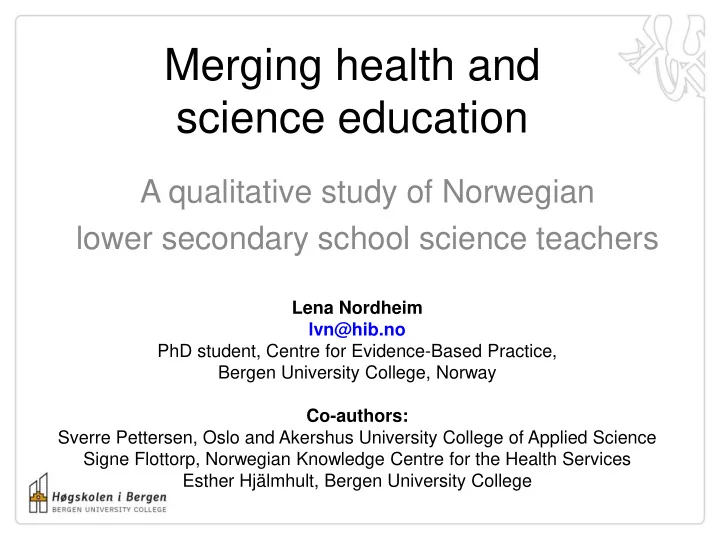

Merging health and science education A qualitative study of Norwegian lower secondary school science teachers Lena Nordheim lvn@hib.no PhD student, Centre for Evidence-Based Practice, Bergen University College, Norway Co-authors: Sverre Pettersen, Oslo and Akershus University College of Applied Science Signe Flottorp, Norwegian Knowledge Centre for the Health Services Esther Hjälmhult, Bergen University College
Background • Adolescents access health information from numerous sources • School science education should facilitate critical appraisal skills • OECD: Scientific process knowledge imperative to appraising claims in contemporary media • Reflected in the Norwegian natural science curriculum «Body, health, lifestyle and nutrition are frequently mentioned in the media. Knowledge and critical assessment of information are important to enable pupils to assume responsibility for their body and physical and mental health»
Aims • To explore secondary school science teachers’ perceptions and practices related to teaching critical and scientific appraisal of health claims
Methods • Interpretive description strategy • Interviews with 25 science teachers in 14 lower secondary schools: – Individual interviews (8 teachers) – Five focus groups (17 teachers) • Purposive sampling • Constant comparative analysis
Results Unexploited opportunities Prioritize knowledge of Inattentive Limited science competences to the relevance content Conceptual model of teachers’ perceptions and practices related to scientific appraisal of health claims
Results • Unexploited opportunities – Project work and in-depth studies – Interest for health topics among students – Health controversies in the media Unexploited opportunities Prioritize Inattentive Limited knowledge of to the relevance competences science content
Results «One expert says that coconut fat is healthy as it contains saturated fat. Another expert says that it is unhealthy because of the saturated fat. The nutritional experts have very opposing views. What should we believe in? Thus I tell the students: Use common sense and do not overdo one way or the other. Try to obtain as much knowledge as you can yourselves» Teacher 1, Focus group 5
Results • Prioritize knowledge of science content – Take the role as health educators – Emphasize «doing science» to confirm science content Unexploited opportunities Prioritize Inattentive Limited knowledge of to the relevance competences science content
Results « We are very focused on teaching facts, it’s a sort of ‘cities in Belgium’ -instruction. This [critical appraisal of health claims] is something else. It is completely open, although it is really just an extension of hypotheses, theories of experiments, falsification, and all these things we are working on in science. [...] The student experiments are also a kind of research, but they are closed by nature. The answers are provided in advance, it is the traditional way of schooling. I think it has a lot to do with tradition» Teacher 1, individual interview
Results • Inattentive to the relevance of scientific appraisal – Assume appraisal skills to be taught in other subjects - Unaware of the scientific dimension of appraisal Unexploited opportunities Prioritize Inattentive Limited knowledge of to the relevance competences science content
Results “I am very concerned about critical thinking, but putting it into a scientific context, that's a shortcoming so far. You make me aware of something now that I might not have been aware of» Teacher 5, individual interview
Results • Limited competencies in scientific appraisal – Confused by conflicting claims Unexploited opportunities Prioritize Inattentive Limited knowledge of to the relevance competences science content
Results «I do not approach it strategically, probably because I don’t have enough knowledge about how to find out what is true in the media» Teacher 3, Focus group 4
Limits • Norwegian context – transferability • Interviews give partial picture of teachers’ practices
Bottom line Science lessons present several opportunities to include scientific appraisal of health claims. However, these opportunities are unexploited due to teachers’ priorities, lack of awareness and limited competencies.
Recommend
More recommend